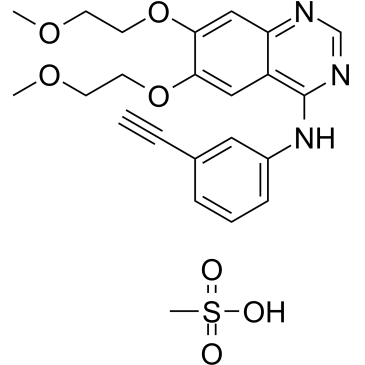Erlotinib mesylate |
| Catalog No.GC36003 |
EGFR inhibitor
Products are for research use only. Not for human use. We do not sell to patients.

Cas No.: 248594-19-6
Sample solution is provided at 25 µL, 10mM.
Erlotinib mesylate inhibits purified EGFR kinase with an IC50 of 2 nM. EGFR|2 nM (IC50)
Erlotinib (CP-358,774) is also a potent inhibitor of the recombinant intracellular (kinase) domain of the EGFR, with an IC50 of 1 nM. The proliferation of DiFi cells is strongly inhibited by Erlotinib with an IC50 of 100 nM for an 8-day proliferation assay[1]. The combination of B-DIM and Erlotinib (2 μM) results in a significant inhibition of colony formation in BxPC-3 cells when compared with either agent alone. The combination of B-DIM and Erlotinib (2 μM) results in a significant induction of apoptosis only in BxPC-3 cells when compare with the apoptotic effect of either agent alone[2].
There is a 1.49-fold statistically significant difference between AUC0-inf after p.o. administration of Erlotinib (5 mg/kg) comparing Bcrp1/Mdr1a/1b-/- and WT mice (7,419±1,720 versus 4,957±1,735 ng*h/mL respectively, P=0.01)[3]. The administration of Erlotinib (10 mg/kg/day, or 20 mg/kg/day) to Bleomycin (BLM)-treated rats shows no exacerbation of lung injuries in indices such as macroscopic findings, lung weights, histopathological scores (lung lesion density and lung fibrosis score), and pulmonary hydroxyproline (HyP) level. The result suggests that Erlotinib does not have any exacerbating effects on lung injuries induced by BLM in rats[4].
[1]. Moyer JD, et al. Induction of apoptosis and cell cycle arrest by CP-358,774, an inhibitor of epidermal growth factor receptor tyrosine kinase. Cancer Res. 1997 Nov 1;57(21):4838-48. [2]. Ali S, et al. Apoptosis-inducing effect of erlotinib is potentiated by 3,3'-diindolylmethane in vitro and in vivo using an orthotopic model of pancreatic cancer. Mol Cancer Ther, 2008, 7(6), 1708-1719. [3]. Marchetti S, et al. Effect of the ATP-binding cassette drug transporters ABCB1, ABCG2, and ABCC2 on erlotinib hydrochloride (Tarceva) disposition in in vitro and in vivo pharmacokinetic studies employing Bcrp1-/-/Mdr1a/1b-/- (triple-knockout) and wild-type mice.Mol Cancer Ther. 2008 Aug;7(8):2280-7. [4]. Adachi K, et al. Effects of erlotinib on lung injury induced by intratracheal administration of bleomycin (BLM) in rats. J Toxicol Sci. 2010 Aug;35(4):503-14.
Average Rating: 5 (Based on Reviews and 28 reference(s) in Google Scholar.)
GLPBIO products are for RESEARCH USE ONLY. Please make sure your review or question is research based.
Required fields are marked with *




















